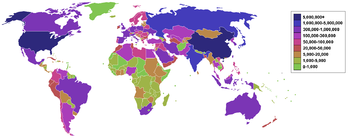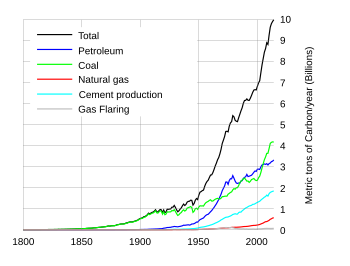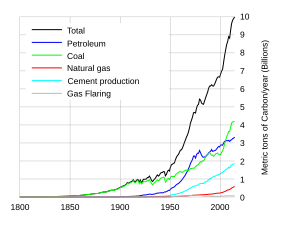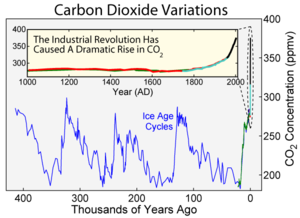 |
| English: A colour version of previous map, ranking countries by carbon dioxide emissions in thousands of metric tonnes per annum, based on List of countries by carbon dioxide emissions as of March 2006. (Photo credit: Wikipedia) |
 |
| The Keeling Curve of atmospheric CO 2 concentrations measured at the Mauna Loa Observatory. (Photo credit: Wikipedia) |
You will hear someone say that, yes, Climate Change seems to be a likely outcome of our use of hydrocarbons and if Climate Change were to happen it would be horrible, cause great turmoil and we would certainly have to do something. But they cannot make that leap to Climate Change writ large. That is terribly unfortunate because Climate Change is happening, you see, and its effects will continue to accelerate as long as we continue to feed its unending appetite for carbon dioxide. It will end, not when its supply of carbon dioxide stabilizes but when it drops.,,a lot. Until we start dumping much less carbon dioxide into the atmosphere than the earth can naturally absorb, the climate will continue to get worse. That will almost certainly happen and the climate will eventually revert to some level that we can tolerate. The uncertainty is whether we will stop producing Climate Change's food supply purposefully or stop because we are no longer around to produce it. Either way it is going to be a very long time.
I am sympathetic with that failure to step up to the reality of Climate Change. It is not often that man has had to face the possibility of a self induced End-of-the-World scenario. It is a bit embarrassing to have to come to grips with that, right when we seem to have mastered this whole consume-till-we-drop thing even to the point of designing our whole civilization in order to assure its continuation. Limits are a tough thing to swallow anytime and it is a particularly unappetizing prospect when you are defining your very existence based on no limits at all. I have not reached the point yet of being able to shout it out to the masses. I am still holding it close to my chest and wondering what to do. I was born in the early age of hydrocarbons and raised entirely in its industrial world. I really don't have another emotional model to fall back on, Unfortunately, since I am pretty old, that means that probably no one in our modern society has a way to really draw on experience or have access to another set of values that might see us through.
We need to talk about this now. We have to have a vision to stand up against what will come. It will not be a vision we have ever encountered before or even a vision that anyone can tell us about. We are going to be on our own.






